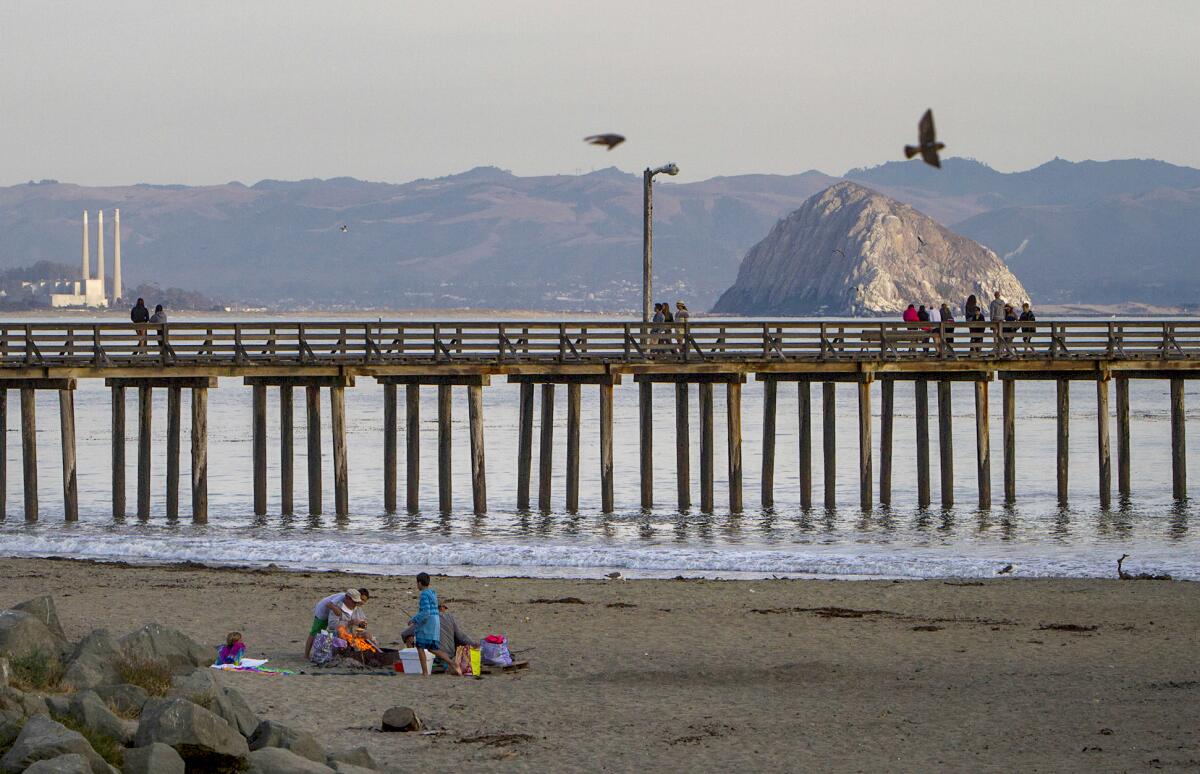In this majority Democratic California district, voting for a Republican isn’t unheard of
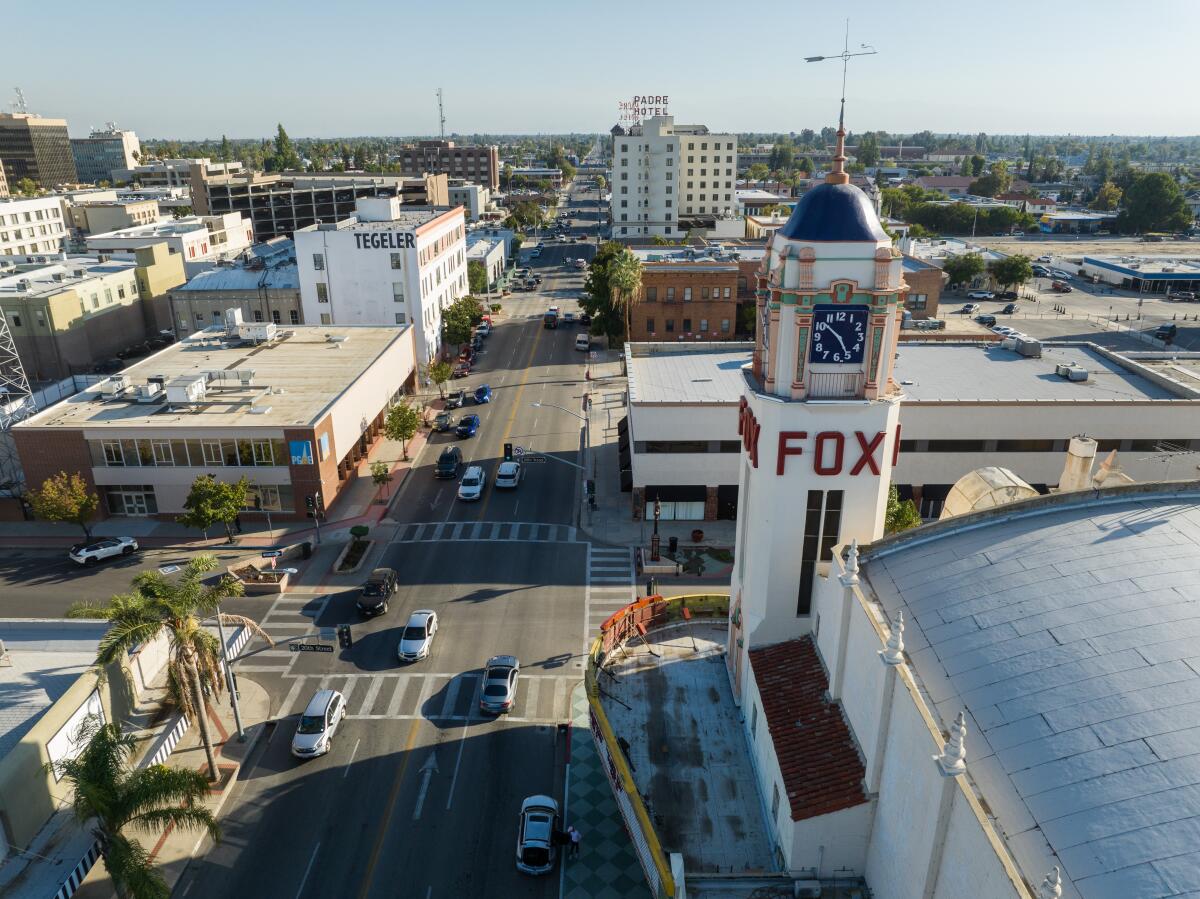
- Share via
Good morning. Here’s what you need to know to start your day.
- Swing voters exist even in deep blue California, helping determine the outcome of congressional races.
- How will Kamala Harris vote on California’s Prop. 36 to toughen some criminal penalties? She won’t say.
- That’s so L.A.: Locals share their experiences that could’ve happened only here.
- And here’s today’s e-newspaper
Sign up for Essential California
The most important California stories and recommendations in your inbox every morning.
You may occasionally receive promotional content from the Los Angeles Times.
How swing voters will affect California’s Central Valley
In deep blue California, the emphasis on battleground states with swing voters might be confusing. Why should voters care about what’s happening in Georgia or elsewhere?
Apart from the obvious answer that whether who becomes the next president of the U.S. could be up to them, swing voters also exist in battleground congressional cul-de-sacs, including those in California.
My colleague Melissa Gomez reported on one such district this week.For these voters, the election isn’t about party-affiliation: Whichever candidate they believe will do a better job to represent this substantially rural region in the southern Central Valley will ultimately receive their support.
And sometimes, it simply boils down to who reflects their upbringing more, who they can relate to better.
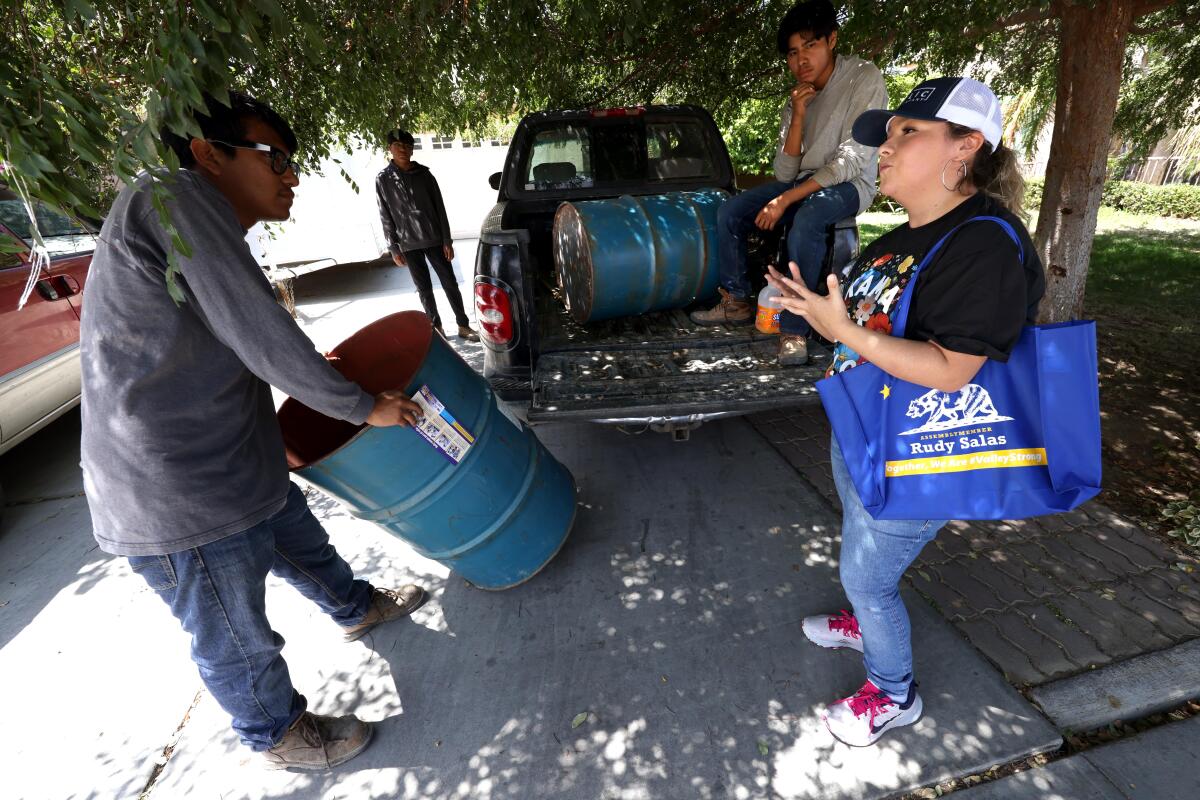
The Valleycrat electorate
The 22nd Congressional District covers parts of Kings, Tulare and Kern counties, stretching from Hanford to Bakersfield. It is a majority-Latino district in the San Joaquin Valley, with more than 70% Latino residents.
On paper, voters have become increasingly Democratic. Forty-three percent of voters are registered Democrats, while 26% are registered Republicans and 23% are registered with no party preference in this heavily agricultural region. (The remainder are registered with other political parties.)
Regardless, the region has regularly elected Republicans to Congress, most recently GOP Rep. David Valadao, who won by 3,100 votes in a district of 775,000 residents — a 0.4% margin — against Democratic candidate Rudy Salas in 2022.
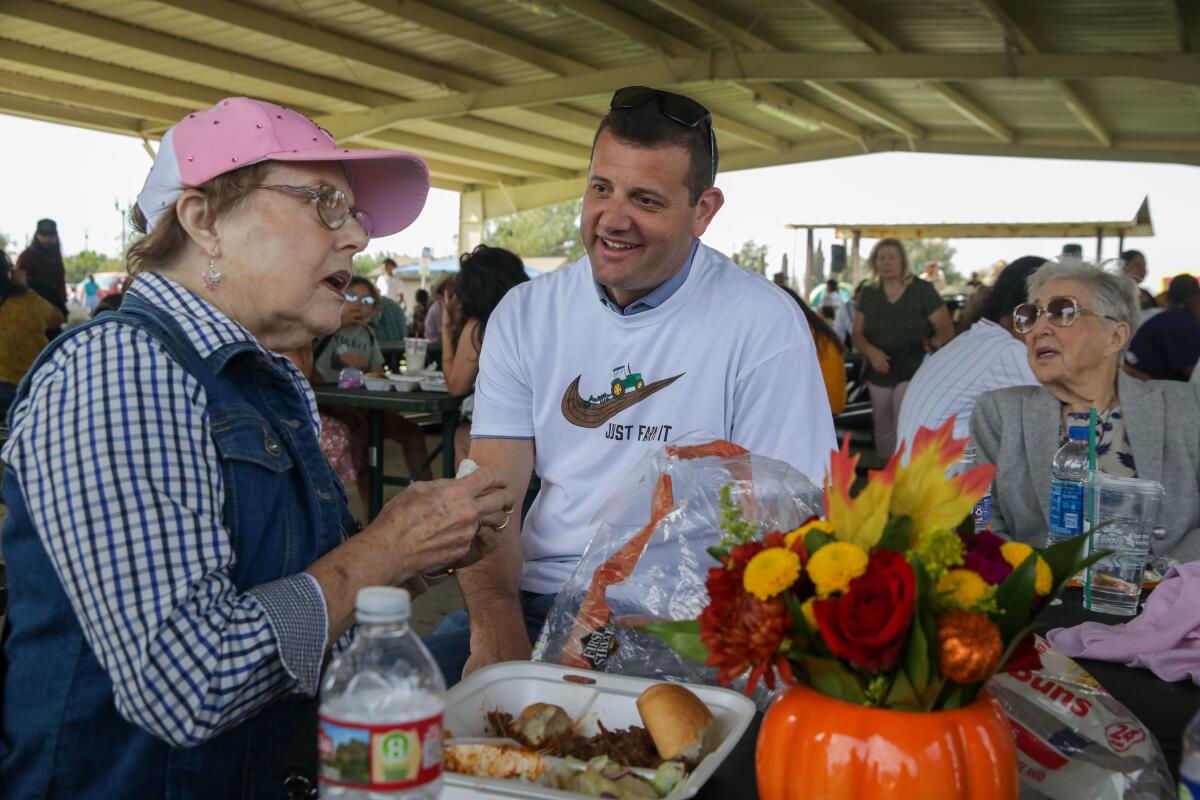
Central Valley congressional races, like the one currently represented by Valadao, often come down to tight margins. In the same election that reelected Valadao, another Republican in a district just north defeated a Democrat by 564 votes.
Instead of voting along partisan lines, Central Valley’s electorate abides by a different set of rules, one that prioritizes voting on a candidate who they believe will do the best job rather than clinging to any one party just because they might’ve previously casted their ballot for them.
This is why moderate Democrats in the region have been nicknamed “Valleycrats.”
But even registered Republicans, like Hanford resident Dolores Coronado Maas, tread on party lines.
The 79-year-old explained to Melissa that she intends to vote for Vice President Kamala Harris for president but Valadao for Congress because of his work with veterans and for being one of the 10 Republicans who voted to impeach then-President Trump in 2021 for his role in the Jan. 6 Capitol riot. (Valadao has not endorsed Trump’s reelection bid.)
“I can’t say anything against [Valadao],” she said. “He’s got guts.”

The line of scrimmage
For the candidates running for Congress in this sprawling rural area, the line of scrimmage seems to be clearer than it is for their electorate.
Valadao, 47, has largely voted along GOP party lines in Congress. And Democratic leaders are hoping Salas, 47, can win voters’ trust to flip the district and fortify the party’s efforts to regain majority leadership in a closely divided U.S. House of Representatives.
Both Central Valley natives are focusing their efforts on showcasing who knows their electorate better and on policies that they can identify with. For Valadao, voters are concerned about water rights, homelessness, crime and affordable housing.
Melissa reported that in a recent interview, Valadao pointed at his most recent efforts of helping “secure $6 million in federal funding to help the city of Delano create a new drinking water well and another $3.5 million to build a regional access road in Porterville.” He also secured federal and state water to keep flowing to farms in the area during years of drought and regulatory cutbacks.
“It’s going out and talking to constituents, figuring out what’s going on, hearing from them directly, spending time in the district, looking at stuff and working on issues to try to make their lives a little bit better,” Valadao said.
For Salas, the first Latino elected to the Bakersfield City Council, his voters are looking for someone who can advocate for affordable healthcare, better access to education and immigration reform and are excited by the potential of a leadership change.
At a recent campaigning event, he instructed canvassers to remind voters that while serving in the California Assembly for a decade, he helped secure $100 million for the California State University system and another $100 million for Bakersfield College; and was a supporter of the landmark 2016 law that entitled farmworkers to overtime pay when they work more than 40 hours a week.
“These elections really come down to just a handful of votes,” he reminded the crowd. “At the end of the day, you guys are going to be the difference.”
So, if the majority of the Central Valley votes for a Democratic president and Republican representative, or vice versa, don’t be surprised. Swing voters, tight margins and dancing on partisan lines exists even in California, and the determining factor might be how many decide to show up at the ballots.
Today’s top stories
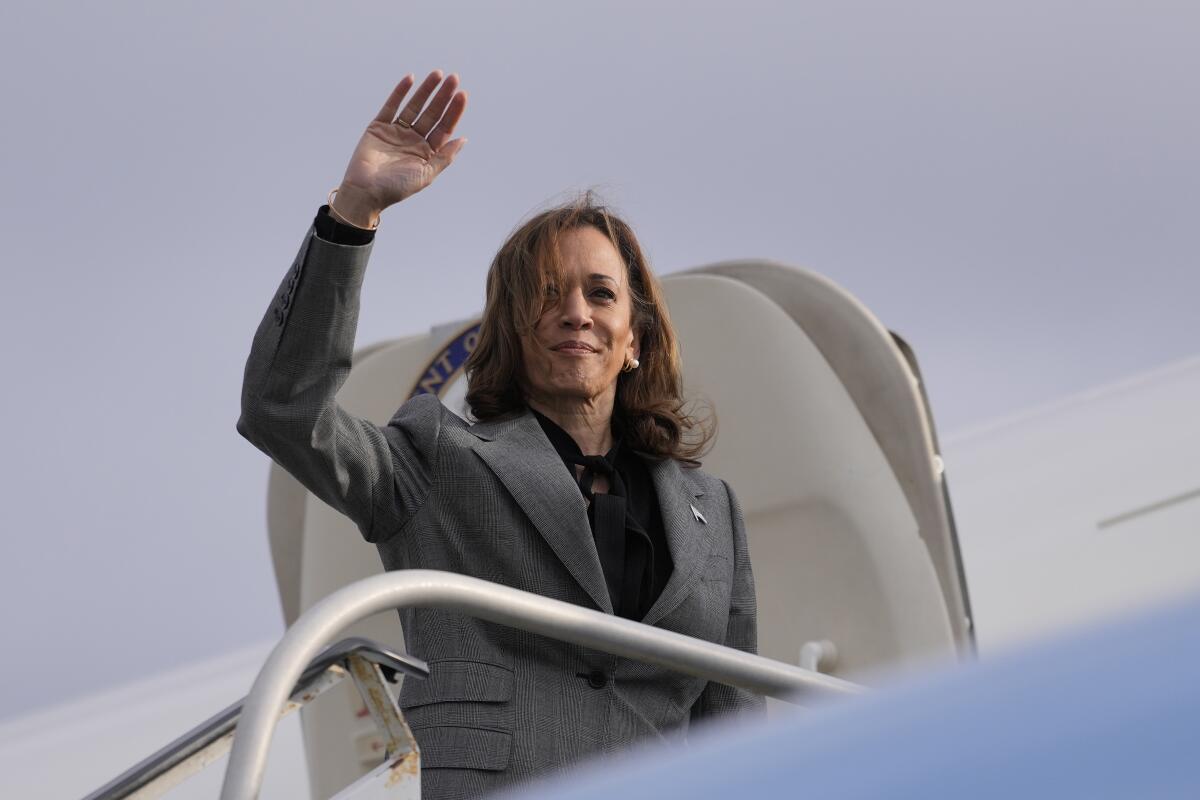
Kamala Harris won’t say how she’ll vote on California’s Prop. 36 to toughen some criminal penalties
- Harris, a California voter, won’t say how she will vote on one of the most consequential criminal justice ballot measures to come before state voters in years.
- The tough-on-crime measure has split her Democratic base but has broad support among California voters, according to polls.
- Meanwhile, here’s a look back at how a rookie Harris took on child sex trafficking before it was a mainstream concern.
- And in other election news, fake Russian news site falsely claimed Harris was in hit-and-run accident.
After the second Metro bus hijacking in 6 months, Mayor Bass renewed promises to improve safety
- Bass and other officials acknowledged that more must be done after an armed man hijacked a bus Wednesday morning in a violent takeover that left one passenger dead.
- Metro says overall crime numbers are up for the first six months of the year — largely due to officers cracking down on trespassers and fare evaders.
- While violent crimes are down slightly, operator assaults increased from 11 in May to 14 in June and 23 in July.
How will the state manage the slow death of California’s gasoline industry?
- California might get into the gasoline refinery business to ensure stable supplies as demand ebbs due to the state’s own policies. But industry officials say that’s a recipe for higher gas prices.
- Gov. Newsom has mandated that by 2035, carmakers and dealers can no longer sell new gasoline-only vehicles in California. And the world is watching to see how California’s climate-first gas policies work out.
Millions were raised to help L.A. County firefighters. Where did it go?
- A foundation set up to benefit L.A. County firefighters is accused of using millions in donations as a personal “slush fund,” according to a lawsuit from the county. The foundation has denied any wrongdoing.
- The questionable spending, according to the county, included $232,500 paid to the foundation’s president since last year.
What else is going on
- A man tossed a bomb into a California courthouse, injuring six people, authorities said.
- Can California’s skyscrapers survive a huge earthquake? L.A. County is about to find out.
- The children of model Kim Porter and embattled mogul Sean “Diddy” Combs are blasting a purported memoir attributed to their late mother.
- Elon Musk’s X says it’s policing harmful content as scrutiny of the platform grows.
- June gloom in September? A deep marine layer envelops the Los Angeles region.
- Shohei Ohtani helped the Dodgers breathe easier with a win over Padres.
Get unlimited access to the Los Angeles Times. Subscribe here.
Commentary and opinions
- Trump voters who disdain him say they liked his policies. Columnist Jackie Calmes asks, What in the world are they talking about?
- Election officials are worried the U.S. Postal Service won’t be up to the task of delivering ballots on time, columnist Michael Hiltzik writes.
- Everyone who grasps the risk of nuclear war says Trump shouldn’t be trusted, author Jill Lawrence writes.
- The L.A. Planning Commission should back a plan allowing apartments and townhomes to be built on single-family zoned properties, The Times Editorial Board writes.
This morning’s must reads
A gem of the Central Coast is becoming a seasonal ghost-town. In a constantly changing California, Cayucos is a perfectly preserved time capsule. But the town is losing its identity as wealthy investors buy up homes for short-term rentals.
Other must reads
- Life without utilities on an active landslide: Makeshift power, dark nights and mounting anxiety.
- From her tree-house studio to high-end galleries, this L.A. potter’s work is turning heads.
How can we make this newsletter more useful? Send comments to [email protected].
For your downtime

Going out
- 🌴 That’s so L.A.: Locals share their experiences that could’ve happened only here.
- 🎬 Saoirse Ronan is having a moment right now with career-high performances in “The Outrun” and the WWII drama “Blitz.”
- 🎭 L.A. Opera gives “Madame Butterfly” a classic Hollywood angle, for better and worse, our critic writes.
- 🍽️ Here are the best family-friendly restaurants in L.A.
Staying in
- 🍓 Looking to switch up your salsa? Here are recipes for ancho strawberry salsa and plum pico de gallo.
- 📺 Disney+ launched a password sharing crackdown. Here’s what you need to know.
- 🤓 “Freaks and Geeks” turns 25, and its brief but legendary status endures.
- 📖 Malcolm Gladwell revisits “The Tipping Point” that sent him to literary stardom.
- 🛹 Here’s how “Tony Hawk’s Pro Skater” changed punk music and video games.
- ✏️ Get our free daily crossword puzzle, sudoku, word search and arcade games.
And finally ... from our archives
On this day in 1960, the first ever televised debate between two U.S. presidential candidates took place, with then-Vice President Richard M. Nixon and then-Sen. John F. Kennedy facing off.
“As a sharp clash of issues and intellects, the ‘great electronic experiment’ which brought the two nominees to the same studio for the first time in U.S. history was a dud,” Times reporters wrote shortly after the debate.
Have a great day, from the Essential California team
Ryan Fonseca, reporter
Defne Karabatur, fellow
Andrew Campa, Sunday reporter
Hunter Clauss, multiplatform editor
Christian Orozco, assistant editor
Stephanie Chavez, deputy metro editor
Karim Doumar, head of newsletters
Check our top stories, topics and the latest articles on latimes.com.
Sign up for Essential California
The most important California stories and recommendations in your inbox every morning.
You may occasionally receive promotional content from the Los Angeles Times.
